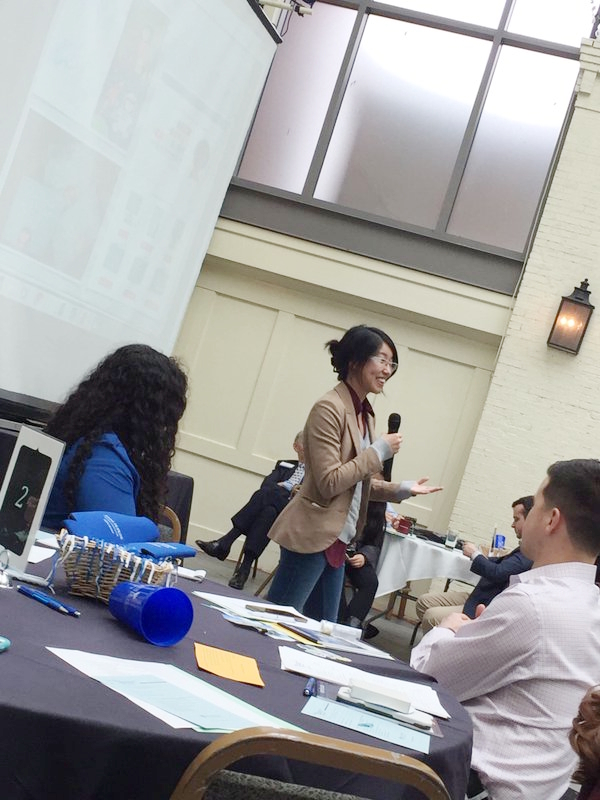I recently gave a talk at a JHU Students and Young Alumni Leadership Symposium.

(Intended) transcript of the talk below:
Unlike the two other speakers you’ve heard from this morning, and like you all, I’m still a student! (I’m also female, but more on that later). So, I was in your shoes about 3 years ago. I knew I wanted to go to graduate school to get a PhD. When I was applying, I decided to go big or go home: I’m only going to apply to the top programs. I’m not going to sell myself short. If I don’t get in, I’ll get a job, build up my resume, and try again next year. That’s the thing about going big or going home: you have to prepare for going home. It may not seem like it now, but your most valuable commodity is time. A PhD takes a 5 to 7 year commitment now. Don’t spend it somewhere where you’re not going to be challenged and pushed.
So I apply to the top programs, which in my field like many others, meant Harvard, Yale, Princeton, MIT, Stanford, and Columbia. And surprisingly, I get an interview everything. Schools always ask where else you’ve applied in your application, so I wonder if that had something to do with it. But when I got to the interviews, I thought: oh crap, I’m one of the least qualified candidate. I had no papers, all my extracurriculars were art; nothing to do with science. Some people had biotech companies already. What am I doing here?
But in hindsight, that was probably largely impostor syndrome. Has anyone here heard of imposter syndrome? Yeah, it’s when you think you’re an imposter, and you only got here by mistake. So people are going to find you out and it’s only a matter of time before you’re discovered. It’s funny because I talk to PIs, Nobel laureates, people who are doing amazing work, and they still say (in private): “I don’t know if I’m running my lab well. I don’t know if I’m doing a good job on this grant.” So some of them still have imposter syndrome! I’ve come to accept that maybe imposter syndrome isn’t something you can rationalize away. Or something you grow out of. But it’s something you just acknowledge, and let go. The thoughts and self doubt will come. But just let it go.
Long story short: I get in everywhere but decide to go to Haahvarhd.
Well actually, I did get asked a lot about why I didn’t have papers during interviews. And it was true: I did research throughout undergrad but not all research pans out. That’s just science. But despite failure, I am still pursuing graduate school so I must be a masochist or I must actually like what I’m doing! I think, despite failure, you persist if you believe in what you’re doing. What I believe in is really at the end of the day is really education, and getting people to educate themselves; providing the tools and resources to peak their curiosity and make it easier to learn and discover new things. In my research, I make bioinformatics tools that allow biologists to understand their data. I recently published a Nature methods paper for a bioinformatics tool to help biologists identify cell subpopulations. In my non-profit work, I make resources to help break gender barriers and encourage girls to go learn more about STEM.
[Casual discussion of cuSTEMized and women in STEM that I didn’t write out the transcript for in preparation for the talk]
But anyways, I ended up going to Harvard. I’m in my 3rd year of the PhD. Things I’ve learned: (1) If you figure out what you want to do and do it. No one’s going to give you permission. (2) You’re never going to have the perfect background for any job. If you have the motivation, then you have more than what most people have. If you don’t know how to do something, figure it out! And you can. That’s what you’ve spent 4 years learning at Hopkins: how to figure it out.
You’re all very talented and skilled. You can really do anything. If you don’t know how yet, you can figure it out.
One interesting question I was asked by the audience was from a man who wanted to know how he could help women in STEM. I thought that was such an important question that too often doesn’t get asked so I should just try to integrate the answer more into my talks in the future.
But, the answer is easier said than done: I think people within STEM need to help women and minorities in STEM by learning to see bias and standing up against it. But I don’t think it’s intuitive what exactly is bias, what counts as a micro-aggression, and so forth. Admittedly, unless you are “colored”, perhaps it’s hard to know that being called “colored” is not exactly complementary. Unless you are a woman in computer science, perhaps it’s hard to intuitively understand why it’s insulting when you get asked whether your boyfriend coded your work for you. As a woman, I have a better understanding, on a personal level, why it is weird to get repeatedly asked for your boss’s availability as if you were his secretary. So I’d be much faster to snap “Hey she’s not his secretary!” when I see someone treat a female student like that.
We, as people in STEM, have to stand up for each other. But that in part means learning when to stand up. So who should teach us?